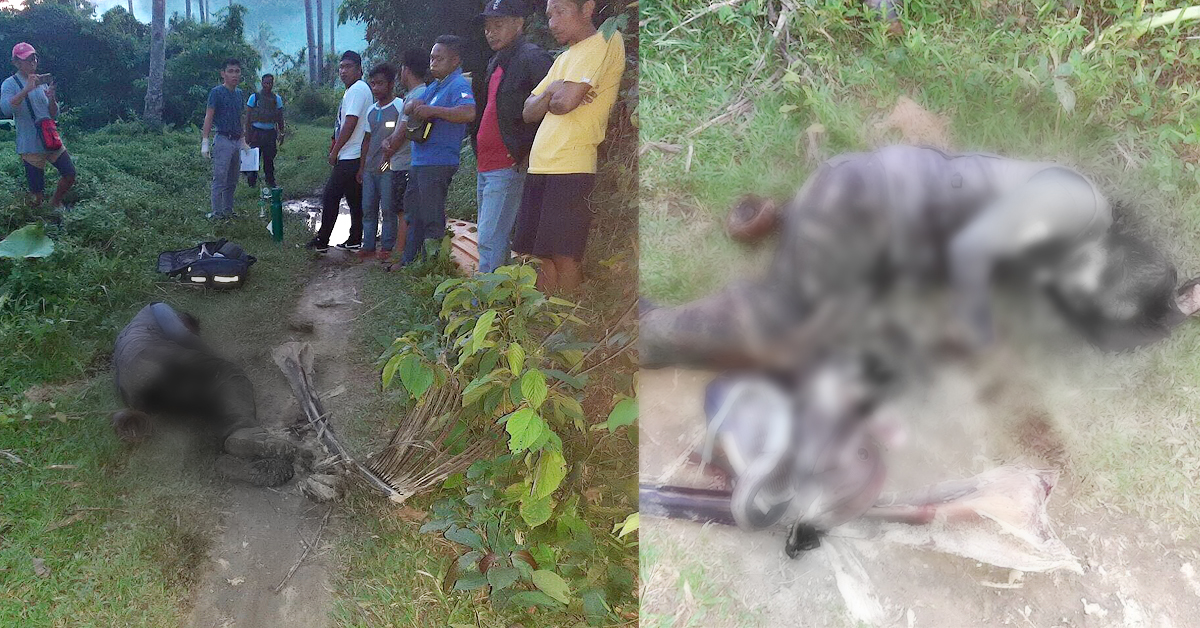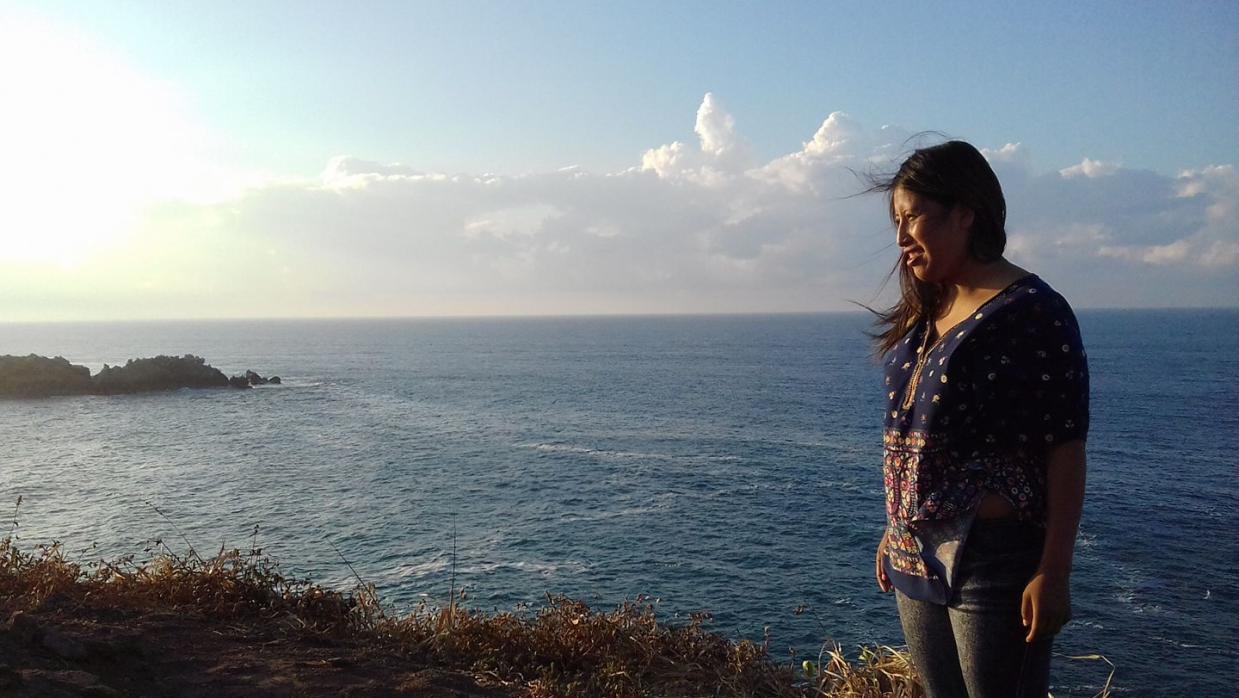
by DGR News Service | Sep 10, 2019 | Biodiversity & Habitat Destruction, Human Supremacy
Image: PRO MIMAROPA
by Liam Campbell
Forest ranger Bienvinido “Toto” Veguilla, Jr. was murdered last week while attempting to stop illegal loggers from ransacking a section of forest in the Philippines. Veguilla was on a routine patrol in the Sitio Kinawagan, Barangay Pasadeña region when he and fellow rangers discovered a group of illegal loggers using a chainsaw and other equipment to destroy the ecosystem for profit. After confiscating their equipment Veguilla and his team departed for their station, but were followed by the illegal loggers and eventually attacked. Unfortunately, Veguilla was unable to escape and was hacked to death by approximately six men.
Veguilla’s murder is a great loss to conservation efforts in the Philippines; he was known as one of the most diligent, hardworking, and courageous members of the Department of Environment and Natural Resources (DENR). He is not the first ranger to be murdered — in 2017, captain Ruben Arzaga was also murdered by illegal loggers in retaliation for his conservation efforts.
These brave individuals and their colleagues risk their lives on a daily basis to protect Earth’s dwindling ecosystems against destruction, often facing death threats and severe retaliation. Sometimes it is easy for environmental activists in priveleged countries to lose sight of the brutal realities facing their comrades in other parts of the world. Next time you hear someone moralizing about the virtues or necessity of pacifism, remember that those notions are an extreme luxury and that the individuals who preach those sermons are generally far removed from risking life or limb.

by Deep Green Resistance News Service | Feb 23, 2018 | Repression at Home
by Cultural Survival
Cultural Survival condemns the murder of the Purépecha environmental activist Guadalupe Campanur Tapia, whose body was found on January 16, 2018 in the municipality of Checrán, Michocán, Mexico. She was strangled to death by two unidentified killers. Investigators have not indicated that Campanur’s death was due to her activism, but they have not ruled it out either.
Threats of violence and violent acts against Indigenous human rights and environmental defenders, particularly women, is an increasingly widespread problem. Frontline Defenders reported that in 2017 they received reports on the murder of 312 defenders in 27 countries.
- 67% of the total number of activists killed were defending land, environmental and Indigenous peoples’ rights, nearly always in the context of mega projects, extractive industry and big business.
- 84% of murdered defenders received at least one targeted death threat prior to their killing.
Femicides, sadly common in the Mexico, have ended the life of a talented and passionate woman: a defender for women’s rights, Indigenous Peoples, and the environment. Campanur’s work earned her the admiration and respect from many in her Purépecha community, but she posed a threat to others.
Campanur died at a young age of 32 years old, leaving a legacy of courageous work that will continue to inspire her generation and future generations. In April 2011, she was among Indigenous leaders of Cherán, who rung the bell calling on people to defend their forests against against illegal and merciless logging. Organized crime groups had been operating in the area destroying the municipality’s natural resources with the aid of the corrupt local officials. Campanur was the only female member of the founding team of the Forest Rangers of Cherán, a community initiative that held community patrols in defense of the life in the forest. Her fellow rangers praised her bravery and dedication.
In the midst of the struggle to defend their lands and resources, the community of Cherán decided to claim their rights as Indigenous Peoples in self-government by electing representatives directly and independently from the costly and corrupt conventional elections, expelling politicians, policies and other state and organized crime authorities involved in corruption from their territory. Campanur contributed to creating one of the best functioning examples of self-government in Mexico. These changes also successfully reduced violence in the area, with the last murder occurring in 2012.
Friends of Campanur reported that she had stopped patrolling the forests, but remained involved in the reconstruction of Cherán’s communal territory and culture as well as social work. Campanur became a member of the community’s Concejo Mayor or “Great Council” which aims regulate and aid public life. Her work for seniors, children, and workers made her an icon in her community.
The Attorney General of the State of Michoacán has announced that a investigation is in process in coordination with the Federal Mechanism for the Protection of Journalists and Human Rights Defenders through the Secretariat of State Government.
by Deep Green Resistance News Service | Feb 11, 2017 | Colonialism & Conquest, Repression at Home
Featured image: Yoryanis Isabel Bernal Varela was shot dead in the head in Colombia. © El Heraldo
by Survival International
Yoryanis Isabel Bernal Varela, 43, was a leader of the Wiwa tribe and a campaigner for both indigenous and women’s rights.
The Wiwa are one of four tribes that live on the Sierra Nevada de Santa Marta, a unique pyramid-shaped mountain in northern Colombia. The Sierra Nevada Indians believe it is their responsibility to maintain the balance of the universe.
Bernal Varela is the latest victim in a long line of attacks against Sierra Nevada leaders, who have been at the forefront of the indigenous movement in South America. Many Indians have been killed by drug gangs, left-wing guerrillas and the army.
In November 2012 Rogelio Mejía, the leader of one of the other Sierra Nevada tribes, the Arhuaco, narrowly escaped an assassination attempt.
José Gregorio Rodríguez, secretary of the Wiwa Golkuche organization, stated: “Indigenous people are being threatened and intimidated. Today they murdered our comrade and violated our rights. Our other leaders must be protected.”
The problem is not limited to Colombia. Indigenous activists throughout Latin America are being murdered for campaigning against the theft of their lands and resources. The murderers are seldom brought to justice.
In January, Mexican Tarahumara indigenous leader Isidro Ballenero López was killed. In 2005 he had received the prestigious Goldman prize for his fight against illegal deforestation.
by Deep Green Resistance News Service | Dec 24, 2016 | Colonialism & Conquest
Featured image: Rosa Andrade was the last female speaker of the Resígaro language. © Alberto Chirif
by Survival International
The last female speaker of the Resígaro language has been murdered in Peru. Her body was found decapitated at her home in the Amazon rainforest.
Rosa Andrade, 67, lived with the Ocaina tribe. Her father was Ocaina and her mother Resígaro.
The Ocaina and Resígaro tribes were victims of the rubber boom, which began at the end of the nineteenth century. Tens of thousands of Indians were enslaved by rubber barons intent on extracting rubber in the Amazon. Many indigenous people died from sheer exhaustion, or were killed by violence and diseases like flu and measles to which they had no immunity.
The Resígaro tribe was eventually wiped out, and Rosa and her brother became the last remaining speakers of the language.
Rosa was also one of the last speakers of Ocaina and was regarded as a pillar of her community. She knew a wide repertoire of songs and stories in both languages and had recently been designated, by the government, to teach children Ocaina
Five thousand of the world’s six thousand languages are indigenous, and it is estimated that an indigenous language dies once every two weeks.
There are over a hundred uncontacted tribes worldwide, and their languages are the most endangered. Survival International is campaigning for the lands of uncontacted tribes to be protected, for where their rights are respected, they continue to thrive.
Rosa’s community suspects that an outsider, known for violent behavior, is responsible for the murder. However, the local prosecutor has declared that there is insufficient evidence to prosecute. The community is calling for a serious investigation to take place to find the culprit.

by Deep Green Resistance News Service | Apr 1, 2016 | Repression at Home
By Cultural Survival
We are the Prey Lang Community Network (PLCN), a group of Kuy ethnic volunteers who join together to protect the Prey Lang Forest, which has been part of our lives for many generations. We come from the four provinces surrounding Prey Lang, Kampong Thom, Preah Vihea, Kratie and Stung Trung and have volunteered, working together to protect Prey Lang for 16 years.
As part of our patrol routine, from March 23 to 27, 2016 activists from all four provinces traveled through Prey Lang patrol to monitor and suppress the illegal logging that is destroying Prey Lang forest. During these five days of patrol we confiscated many cubic meters of wood, 35 chainsaws, and other materials involved in logging activities. Over the past two months of 2016 we have confiscated 85 chainsaws and many more cubic of wood from illegal loggers in Prey Lang.
On the evening of March 26 we camped overnight near Ta Chuel stream, in the Bueng Char region. On March 27, between 1:30 and 1:40 in the morning, local time, a group of people slipped through our camp and attempted to kill one of our youth activists, Phan Sopheak, who was asleep in her hammock. We did not see their faces and do not know how many they were, but our activist was badly injured on her left leg. If she were sleeping the other way, they would have cut her throat. The criminal soon escaped after Sopheak yelled for help. This was clearly an act of attempted murder, with malice toward her and the rest of the activists. Sopheak is one of the young Prey Lang activists who was nominated to represent PLCN to receive an Equator Prize from UNDP in December 2015 in Paris.
Sopheak was sent to a local clinic for quick treatment on the same day and is now safe, but her left leg is seriously injured.
Sopheak is the third indigenous environmental activist to be attacked this month, the other two were indigenous activists murdered in Honduras on March 3 and 16, 2016.
We, PLCN, are in shock and are very concerned for our safety amid increased intimidation and threats on our lives like this attempted murder by illegal loggers and those supporting them. Meanwhile the level of deforestation in Prey Lang had increased dramatically since early 2016. Without support from the Cambodia government, Prey Lang will cease to exist and our livelihood will disappear. Therefore, we request the following to the Cambodia government:
- Fully investigate the attempted murder on Sopheak and bring those criminals to justice.
- Permanently criminalized all forms of timber trading, both legal and illegal, in the Prey Lang region.
- Stop all logging activities in the Prey Lang region.
- Conduct Investigations to determine who is involved in the logging business.
- Help to intervene and cooperate with PLCN to protect Prey Lang.
For more information, please contact our PLCN members from all four provinces below:
- Mr. Pay Bunlieng member of PLCN from Kratie at 097 611 3807
- Mr. Houen Sopheap member of PLCN from Kampong Thom at 012 373 441
- Mr. Chie Sokhouen member of PLCN from Stung Trung at 096 316 2866
- Mrs. Phok Hong member of PLCN Preah Vihea at 012 948 682



